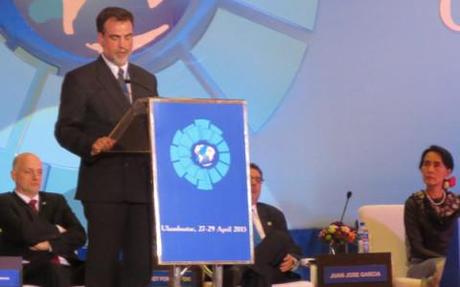
Andrew Wilson of CIPE speaks at the 7th Ministerial Meeting of the Community of Democracies in Ulaanbaatar, Mongolia.
The seventh ministerial meeting for the Community of Democracies (CD) was held last month in Ulan Bator, Mongolia. This year, for only the second time, the business community met as the Corporate Democracy Forum (CDF) to share its views with the CD ministerial, and CIPE was invited to participate.
The Community of Democracies is an intergovernmental coalition of over 100 democratic nations established by Polish Foreign Minister Bronislaw Geremek and U.S. Secretary of State Madeline Albright in 2000 to promote democratic rules and strengthen democratic norms and institutions.
In conducting its work the CD actively seeks input from a number of stakeholder groups including women, youth, parliamentarians, and civil society, who also gather during the ministerial meetings to provide their own viewpoints and recommendations on what the organization’s priorities should be and how to achieve its goals. The CDF represents the private sector’s voice in that discussion.
The overriding theme that dominated the CDF’s discussions was the concept of companies exercising a stronger sense of corporate citizenship, in which they recognize the broader role and leadership position they have within democracies as wealth creators, employers, taxpayers, and leaders. For their part, governments need to encourage companies to take a stronger role, and welcome them in partnership.
Organized by the Mongolian Chamber of Commerce and Industry, the meeting highlighted steps that both the public and private sector can take to promote democracy through actions in three areas: improving public-private dialogue, promoting anti-corruption actions, and corporate social responsibility.
The CDF recognized that sustainable economic development must be based on private sector growth, and, as a stakeholder in this process, business requires an equal seat at the policy table. While sounding simple this task often requires a commitment from both sides of the dialog that sometimes signals a change in the way things are done. Government officials have to get used to the idea of business as a policy partner, and businesspeople must be prepared to enter into dialog in a thoughtful and constructive fashion.
Recognizing that the business community is not a monolith the CDF called on CD members to ensure inclusiveness by extending their dialog to the broader business community including, national, regional, sectoral, and women’s business groups.
In terms of the fight against corruption, the CDF recognized that businesses are part of the “supply and demand” equation that allows corruption to flourish, and as such the business community has an obligation to lead through example. The CDF highlighted the work of programs such as the World economic Forum’s Partnering Against Corruption Initiative (PACI), and other efforts led by business associations and NGOs that seek to help companies improve ethical standards and implement anti-corruption initiatives. The CDF called on CD governments to encourage the establishment of such efforts.
In the field of corporate social responsibility, the meeting highlighted the important role business has to play in promoting sustainable development. To this end, the CDF’s deliberations put the emphasis on private sector action in finding ways to support the implementation of all 10 Millennium Development Goals in a fashion that encourages sustainable and “green” development in transitional and aspiring democracies. As with the other topics for discussion, emphasis was placed on the need for effective public-private dialog on how to achieve these goals.
The overall sense at the CDF was one that appreciated the opportunity the CD has extended to all the stakeholder groups to provide their input on a more visible and equal footing, showing that sustainable democracy is built on consensus and inclusion. It is a lesson other international inter-governmental bodies could more effectively learn.
Andrew Wilson is Regional Director for Eastern Europe & Eurasia and South Asia at CIPE.

